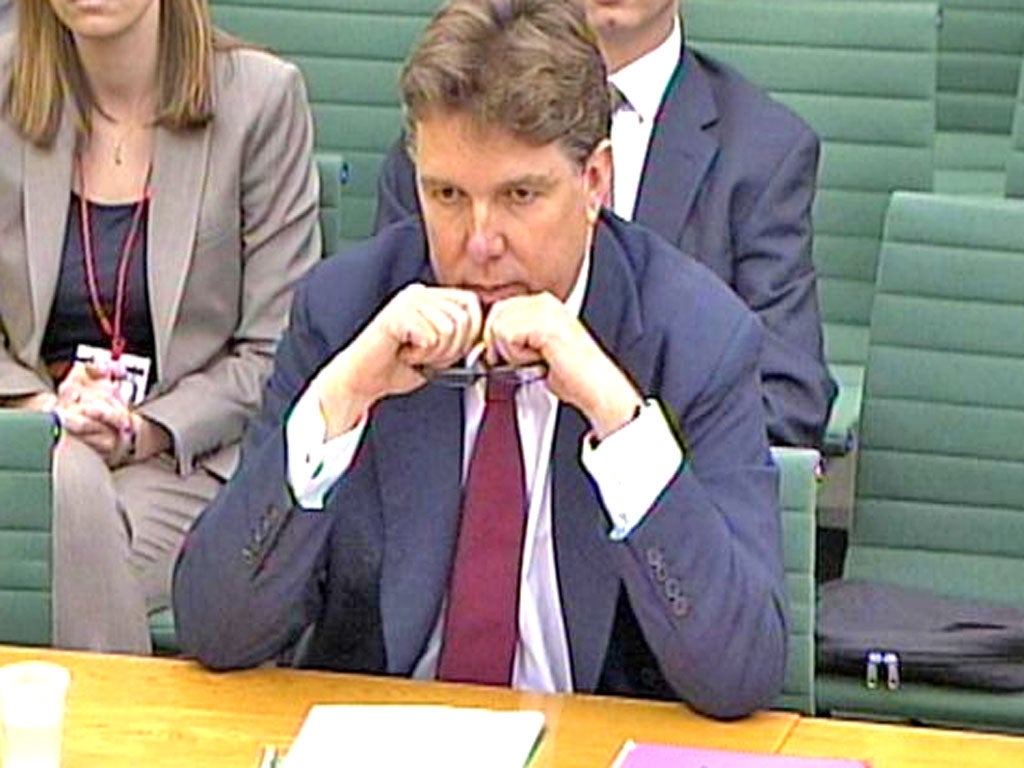Labour did not lean on me, insists Bank deputy
Tucker denies he pressured Barclays to rig rates and casts doubt on Osborne allegations

George Osborne's assertion that Labour ministers were "clearly involved" in manipulating interest rates during the financial crisis appeared to be unravelling last night after the claim was disputed by the Bank of England.
Giving evidence to the Treasury Select Committe, Paul Tucker, the deputy governor, categorically denied that any minister, adviser or official had tried to "lean on" him in 2008 over Libor rates. He also rjected suggestions that he himself had put pressure on Barclays to lower their interest rates in a conversation with the bank's then chief executive Bob Diamond.
He said an email note of a conversation written by Mr Diamond had given the "wrong impression" and that the concerns he was flagging up was that Barclays itself was reporting inaccurate rates. "It was not remotely in my mind during this conversation that I could be misinterpreted," he said.
"It [the email] should have said 'Are you ensuring that your senior management are following the day-to-day operations of your money desk [that sets Libor]? Are you ensuring that they are not marching you over the cliff inadvertently?'"
Mr Tucker's intervention will delight Labour and in particular Ed Balls, who was the target of Mr Osborne's original claim. But his statement will not play well in the Treasury and could damage his prospects of succeeding Sir Mervyn King as Governor when he steps down in the autumn.
Last night Mr Balls said it proved Mr Osborne's allegations were "totally false". "He should now publicly withdraw these false allegations and apologise," he said. However, Mr Osborne's aides suggested that his evidence did not explain what "Labour figures knew or were saying" to banks about Libor.
Mr Tucker said the first he knew about accusations about the widespread fixing of the Libor rate was a few weeks ago when the Financial Services Authority report was being published. "[At the time of the financial crisis] we thought it [Libor] was a reasonable indicator of what was going on," he said. "It went up a lot after Northern Rock and after Lehman Brothers [collapsed] it absolutely shot up. The rankings seemed to broadly make sense. We all used it as a reasonably reliable summary [of the cost of bank borrowing]."
As a consequence of what he now knows Mr Tucker said he would describe the setting of the Libor rate as "a cesspit" and called for an end to the practice of "self-certification" under which banks submit figures on the basis of their own judgments rather than actual transactions.
And in a strong suggestion that he believed other key banking indicators could also have been fixed he said the review of the operation of Libor being undertaken by the Financial Services Authority's Martin Wheatley should also look at all indices which rely on self-certification.
Mr Tucker was repeatedly pressed on his assertion that he did not know, or have suspicions, that the Libor rate was being fixed. The committee drew his attention to the minutes of a meeting that he chaired which stated that some officials "thought that Libor fixings had been lower than actual traded rates through the period of stress".
But Mr Tucker insisted that he did not believe that this was evidence of "low-balling", rather that it reflected a concern that banks were not borrowing and were trying to reflect the rates they might be able to borrow at rather than the real ones. He stressed that the Bank of England was not responsible for operating Libor and had no regulatory responsibilities over it. At certain points in 2007 and 2008, he said, there was virtually no inter-bank lending going on, so submissions were based on notional figures. He added that it would normally be the practice to take contemporaneous notes of conversations such as his phone call with Mr Diamond. But this was not possible during the financial crisis as so many phone calls and meetings were taking place.
Join our commenting forum
Join thought-provoking conversations, follow other Independent readers and see their replies
Comments
Bookmark popover
Removed from bookmarks